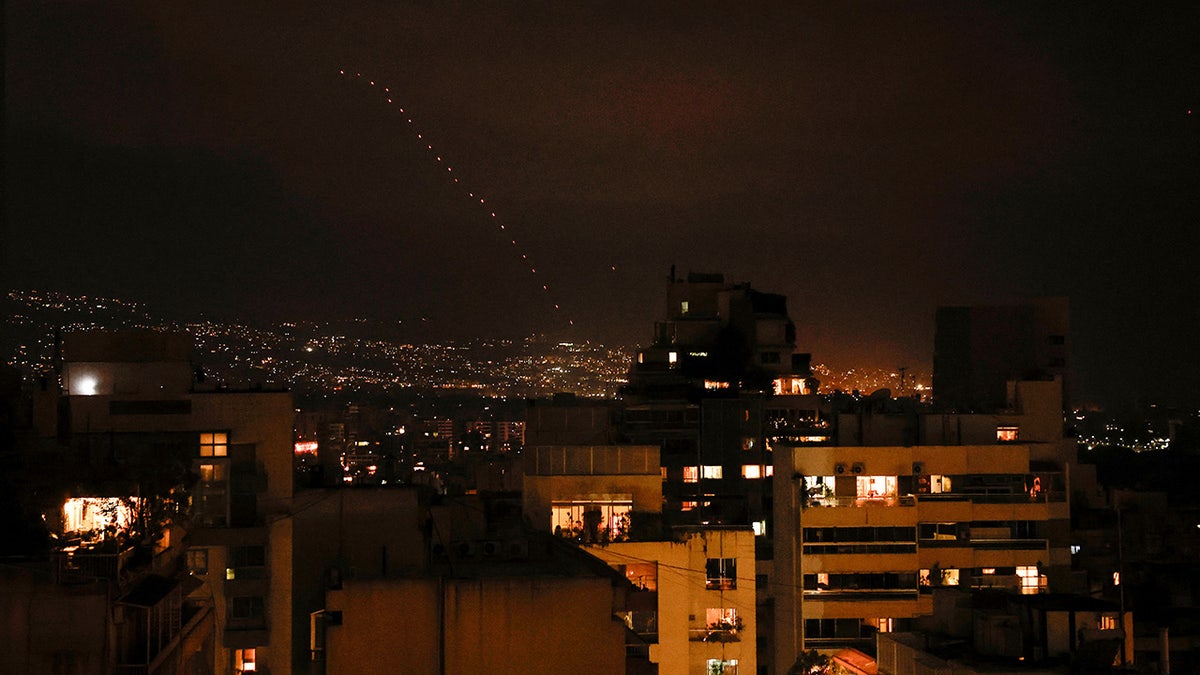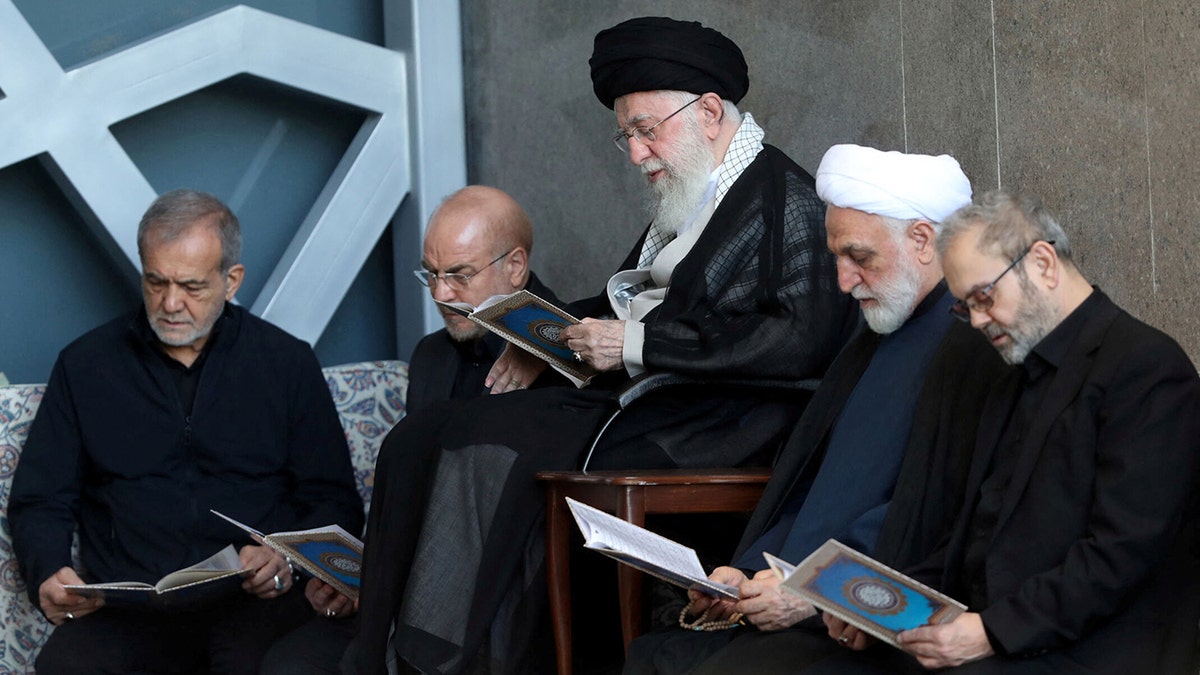A “painful” Israeli response weighs over the heads of the Iranian regime after their ballistic missile attacks on Tel Aviv on Tuesday.
President Joe Biden has insisted that an angry Israel should not strike Iran’s nuclear sites – and should make sure its response is measured – proportional.
“Iran launched a war into Israel,” said former deputy director of national intelligence Kash Patel.
“So to say that the Israelis who are defending themselves and our hostages shouldn’t attack sites in Iran that could kill them – especially when you’re the one who gave Iran $7 billion as a commander in chief and then allowed them to acquire nuclear materials – is wildly political.”
On Thursday, he revealed that he was “discussing” recommending Israel target Iran’s energy facilities.
“That put the oil markets into a tailspin, even if we are talking to them about it. It’s not something you muse about publicly,” said former Trump deputy national security advisor Victoria Coates.
“If you’ve made a decision, and you have something to announce, fine. You want to level with the American people as much as you can. These random comments are really damaging and confusing to the Iranians, because . . . they don’t have any guidelines or guardrails about what might be coming and so they might do something weird.”
IRAN’S AYATOLLAH KHAMEINI DEFENDS MISSILE ATTACKS ON ISRAEL
Israel’s counterattack could come at any moment. “We will act. Iran will soon feel the consequences of their actions. The response will be painful,” Israel’s U.N. Ambassador Danny Danon told reporters.
Rather than its longtime goal of helping to negotiate a ceasefire, the Biden administration has now shifted its priority to containment – helping the region avoid all-out war between its two hegemonic superpowers.
“This is the 1930s all over again. G7 leaders – led by President Biden – are urging Israel to have a proportional and limited response against the Iranian regime,” Sen. Lindsey Graham, R-S.C., told Fox News Digital.
“The idea of telling Israel what targets to strike ignores reality,” he went on. “Would a proportional response be launching 200 ballistic missiles from Israel into Iran, mimicking what the Iranians did to Israel?”
Former President Donald Trump has not said how Israel should respond to the attacks – which he insists never would have happened under his watch.
Striking Iran’s nuclear facilities risks provoking all-out war on yet another front for Israel in the eyes of the Biden administration. The Trump team is caught between an anti-war mindset and a penchant for supporting Israel without conditions. It’s unclear whether they still believe the two can exist in harmony.
Proportionality is “clearly not what Israel is doing,” according to Coates.
“It really seems to me that after the Prime Minister [Benjamin Netanyahu] left Washington in July, after that visit, some factor, or combination of factors, really changed his calculus,” she said.
IRAN WARNS OF ‘DECISIVE RESPONSE’ IF ISRAEL CROSSES ‘RED LINES’
“He appears to have gotten home with the attitude of, ‘I want to get everything I can get done before the election.’ He’s not really listening to the White House at all, which is unfortunate.”
After Iranian plots to assassinate him and the hacking of his campaign, Trump did say that if he were president, he would tell Iran, “I’m going to blow you to smithereens” if they harm any U.S. political figures.
On Tuesday, Trump was asked whether he wished he had responded more forcefully after Iran fired dozens of missiles at U.S. forces stationed in Iraq in 2020, leaving many with traumatic brain injuries.
“So, first of all, ‘injured.’ What does ‘injured’ mean? ‘Injured’ means — you mean, because they had a headache? Because the bombs never hit the fort,” Trump said.


“So just so you understand, there was nobody ever tougher on Iraq,” Trump continued, saying ‘Iraq’ instead of ‘Iran.’ “When you say not tough, they had no money. They had no money for Hamas. They had no money for Hezbollah. And when we hit them, they hit us. And they called us, and they said, ‘We’re going to shoot at your fort, but we’re not going to hit it.'”
Defense officials have said more than 100 suffered traumatic brain injuries after the January 2020 attack.
That attack came after Trump ordered the killing of Iranian General Qassem Soleimani due to an uncovered Iranian plot to kill American diplomats and service members.
Trump vowed to hit 52 Iranian sites “very hard” if Iran were to carry out the plot, representing the 52 Americans held hostage in Iran for 444 days after being seized at the U.S. embassy in Tehran in November 1979.
Still, in January, Iran lobbed attacks on two Iraqi bases housing U.S. troops, including the Ain al-Assad military base, and a second facility near Erbil airport.
In March, three U.S.-led coalition forces were killed when multiple rockets hit Taji military base.
Trump, who withdrew from the Iran nuclear deal and reimposed sanctions on Tehran, has insisted to reporters this week that “nobody [was] ever tougher on Iran” than he was.

‘Look at the World today — Look at the missiles flying right now in the Middle East, look at what’s happening with Russia/Ukraine, look at Inflation destroying the World. NONE OF THIS HAPPENED WHILE I WAS PRESIDENT!’ he wrote on Truth Social.
Alexander Vindman, the former Trump National Security Council Director for European Affairs for the United States, claimed that the former president was “fearful” of escalation with Iran.
“Iran struck first and early, during Trump’s presidency, attacking US troops. Trump consistently recoiled in fear inviting further attacks,” he wrote on X.
“Fact check: In 2020, Iran fired ballistic missiles at U.S. forces in retaliation for the Soleimani assassination. 110 U.S. service members sustained traumatic brain injuries. Many administration officials remain on an Iranian hit list today,” former White House press secretary Stephanie Grisham said.
But Patel argued the Biden administration’s lifting of sanctions on Iran — and the Obama administration’s 2015 nuclear deal — is what led to the attacks in the first place.
“The JCPOA, which was called the ‘Iran nuclear deal’ for a reason. It was never intended to prevent Iran from having a nuclear weapon. It literally gave them one on a timeline,” he said.
“Now I believe they have one, because for four years they haven’t stopped them or slowed them down. They’ve only been successful in politicizing national security.”
Read the full article here











